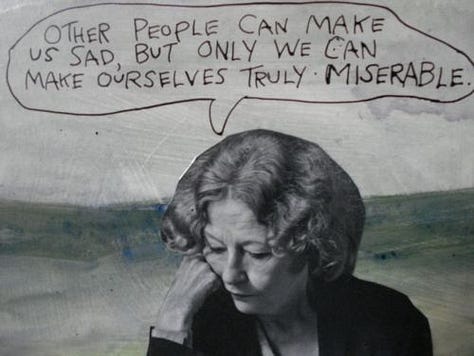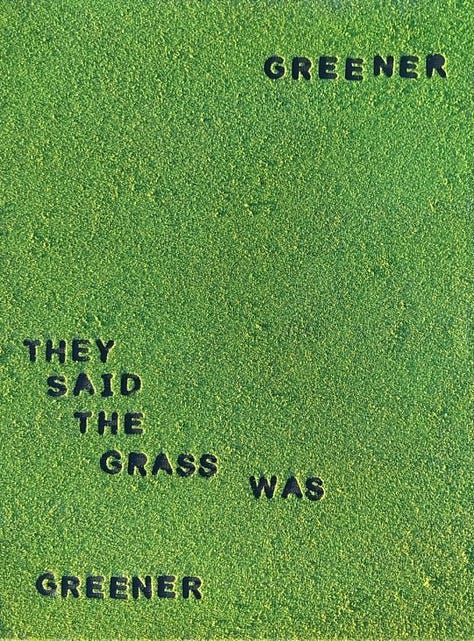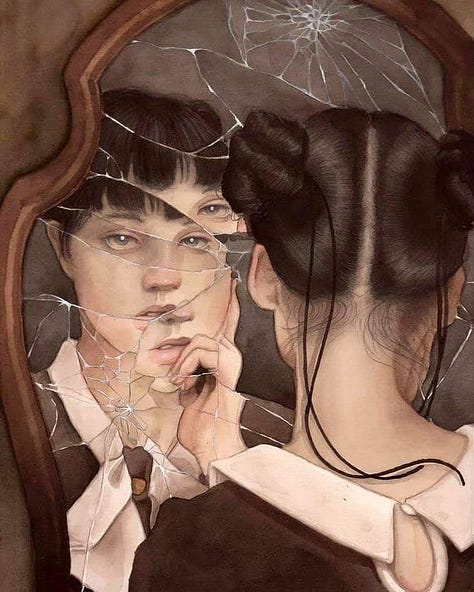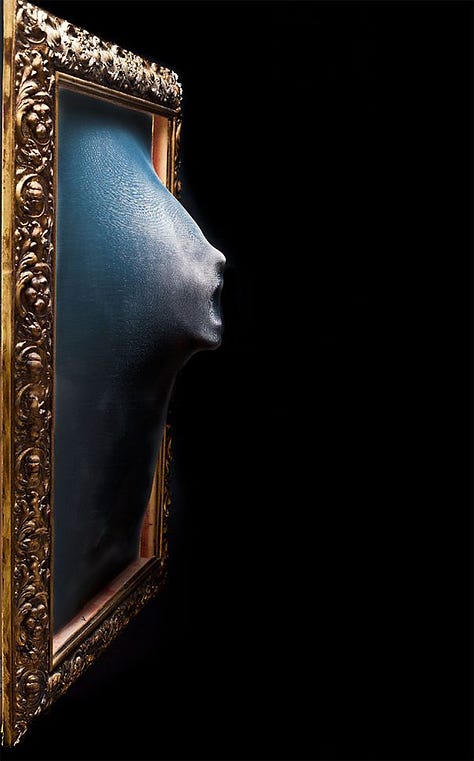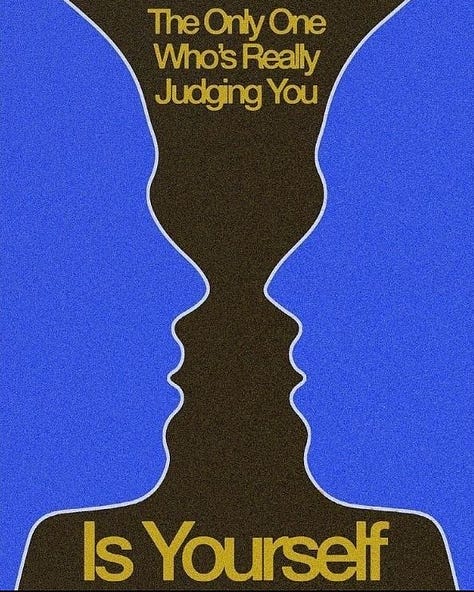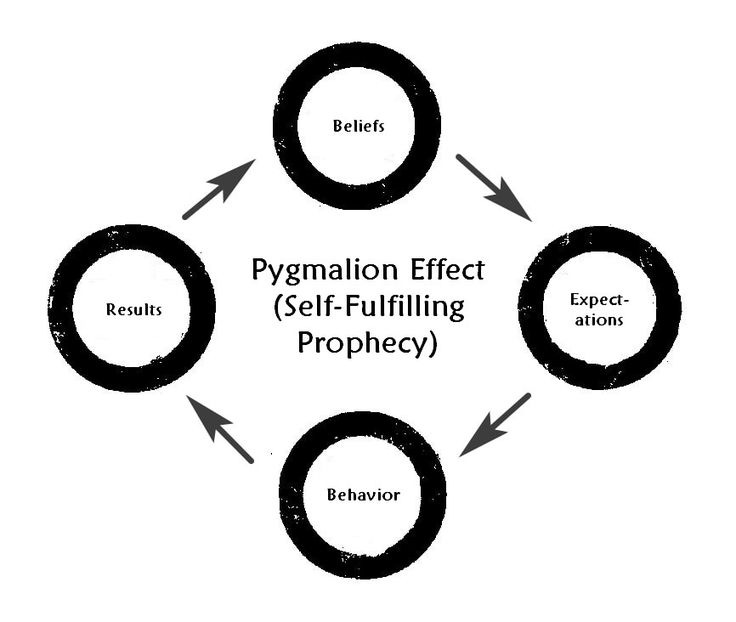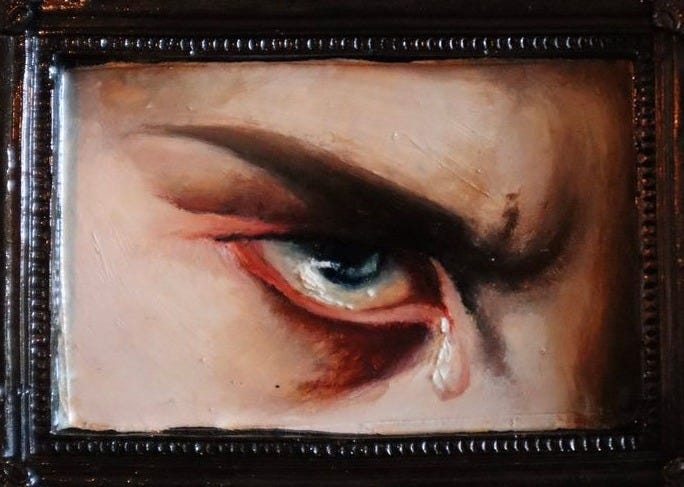
What do you think of, when you hear the word envy? What does it make you feel? Does it remind you of anyone in particular?
Envy is usually portrayed as a silent, insidious monster; waiting for you when you least expect it. It slithers out from under your bed to wrap itself around you in a suffocating hug, its green eyes bore through your skull, filling your mind with warped visions of what should be yours. Envy curls your face into something ugly, the sour taste crawling up the back of your throat. The ancient Greeks believed envy caused a chemical imbalance, acidic bile that corroded you from the inside out. An emotion so toxic, you could see it moving underneath your skin.
But what if, underneath it all, this deadly sin was hiding something more sinister? What if I told you that Envy had a twin? An imposter?
I’m not here to defend envy as greed. I’m here to argue something sharper: I don’t think you’re envious. I think you’re ashamed.
What you experience as ‘envy’ is just the byproduct of a deeper self-rejection. You don’t envy their life, you envy their lack of shame. Their ease. Their unapologetic ownership of something you’ve spent your life suppressing.
In this argument I will show you that envy is nothing more than self-manipulation, a horrid, contorted, masochistic affair that you have fallen in love with. You have wrapped yourself around the finger of a hand that will never play a winning game, and it’s time to unravel. I’m here to examine what envy actually means, and why it might be the most honest feeling you’ve ever had.
Let’s begin.
EXHIBIT A: Envy Is a Mirror, Not a Monster
When you look in the mirror, who do you see? Do you see the person you are, or the person you could’ve become? Are you able to tell the difference?
Envy is a mirror. It doesn’t reflect someone else’s superiority. It reflects the version of you that never materialized. It makes you see the parts of yourself you think are flawed, the versions of yourself that didn’t live up to your dreams, your desires. It’s a fun house mirror, distorted and ugly.
Lacanian psychoanalysis calls this the mirror stage: the moment we mistake a reflection (the contorted piece) for the whole self. It’s a very tricky slight of hand: envy makes you believe that the negative emotions you’re experiencing are a reaction to someone else, when in reality, it is a reaction to yourself, and what you have or haven’t done. It’s jealous, it’s mean, it’s deprecating. Above all, it’s convincing.
You see someone with something you deeply crave, be it a lifestyle, a relationship, a perceived body image, and seeing them embody it so profoundly is a sharp reminder that you can’t do the same. You don’t feel the way they do, you don’t have what you want. It doesn’t feel like motivation. It feels like humiliation.
You might be envious of them, but the root of this feeling is something entirely different: you’re avoidant. You don’t want to admit that your choices kept you the same while theirs changed them. That they moved, and you stayed still. That they integrated what you repressed, boldness, restraint, audacity, imagination, and used it to build the life you wanted. You take it personally, it feels insulting.
What you call envy is the emotional reckoning of coming to terms with your own perceived failure. It’s the ache of watching someone else become the version of yourself you didn’t have the nerve to pursue.
You’re witnessing your un-lived potential, and that’s why it burns. Because you know. And instead of owning that failure, you attack the object of your desire. You project. You belittle. You pretend not to care. It’s easier to dismiss than to evolve. Easier to resent than to try again. Cynicism becomes a shield. But you’re not protecting anything. You’re just hiding.
We don’t envy the foreign. We envy the familiar made real. And the truth is: the mirror never lies. You just don’t like what it shows you.

EXHIBIT B: The Myth of the Moral Underdog
The underdog mentality is a psychological disposition in which someone identifies with being underestimated, disadvantaged, or expected to lose. This gives them meaning, identity, and a sense of moral superiority that through suffering, pain makes them worthy. The cultural critic Susan Sontag called this “the aesthetics of suffering”. The struggler feels more authentic than the winner. All of this is an elaborate psychological defense mechanism: if I can’t have it, then it’s wrong to even want it.
Allow me to be perfectly clear: wanting more for yourself, your life, wanting to live up to your potential, to be great, to be genius, is not a moral failing. Self-actualization is not greed, its a human need. In fact, self-actualization is the final stage of psychological development. To resist it is not noble, it’s willingly regressive.
We love the myth of the underdog, but we forget the point: The underdog is someone who was written off, mocked, demoralized. Someone who wasn’t given a fair shake, belittled for even thinking they stood a chance. They weren’t applauded for losing. They were applauded for winning. The pride of an underdog is felt after, after they have accomplished what no one else thought they could, what no one else had the courage to believe in except for themselves.
Thinking that you are an underdog in life because you have refused to step up to the plate of effort is delusional. Your entire identity becomes consumed by the parasite that is pain, and you, wrapped in the gauze of moral superiority, lick your wounds. You self-sabotage your wins, you internalize your shame, and you block out the things you really want because now you don’t feel worthy of them. You feel guilty for wanting them at all, because you don’t think you deserve them, and because of this, you have claimed yourself as the loser in life. The underdog, the one who never wins.
But what you’re missing is crucial, the underdog does win. The underdog wins because they stop at nothing; they try and try and try again.
There is nothing more disrespectful than refusing to live up to your own potential. Nothing noble to be found in keeping yourself small. I promise you, there are no statues of the person that never tried. And I think you’re worth a bit more than whatever makes you scared to start.
This leads me to my final argument:
EXHIBIT C: The Self-Fulfilling Prophecy of the Unattainable Life
Oh, have I fallen victim to this. I didn’t even realize it was happening, it crept in so slowly and boarded my train of thought. The hours I would spend at my office job, pining for a life I wanted, horribly, hideously envious of everyone I saw accomplishing things that I wanted. I convinced myself that somehow, they were just better than I. No matter how smart I was, they were smarter. No matter how confident I was, they were luckier. On and on I went, down the spiral of my abandoned desires. I told myself a thousand different things, New York is just hard, only the lucky few make it, they’re just born that way. One day, I met someone I thought had it all. To my shock and horror I realized something crucial: the flaws were all mine. This person wasn’t special, they weren’t even particularly bright. But they had something books and money couldn’t give: they had the unwavering confidence, not arrogance, but the magnetizing, radiating glow of someone who was unafraid to believe in the beauty of their dreams. And because of this, they did. And because they did, their dreams turned into their life.
The unattainable life becomes a self-fulfilling prophecy: the belief that you’ll never get there keeps you from ever starting.
Specifically and psychologically speaking, this mindset is a form of learned helplessness— the belief that because something didn’t work once, it will never work again. You fail a few times and allow this to poison your outlook. It will never happen for me, nothing I do matters, I’m just not built like that, and on it goes. Edison failed 1,000 times before getting the lightbulb to flicker on, but for some reason, we don’t romanticize these trials and errors for ourselves. We use them as proof of failure, instead of proof of growth.
This isn’t realism. It’s defense; it’s envy disguised as superiority. This kind of fatalism feels wise, but it’s just ego preservation. You don’t want to risk the sting of failure, so you stay in the safety of theory. You fantasize. You spectate. And the longer you stay removed, the easier it becomes to say, I didn’t really want it anyway. Constantly observing, never engaging.
Most people don’t envy miracles. They envy discipline. They envy effort. They envy the years someone else put in while they were still negotiating with their own doubt. You're not envious of their success. You’re envious of their self-respect. Because they kept going. Because they earned it. You never gave yourself a real chance, and so the prophecy fulfills itself. You do nothing, so nothing changes, until one day you use this as proof. Your avoidance becomes evidence. You stayed loyal to the version of yourself that never risks disappointment, and in doing so, you guaranteed it.
Nothing happens for a reason. If your life sucks, its because you let it.
Closing Argument
Envy is a skeleton key. It allows you to unlock the doors of your potential, or be buried with the bones of who you could’ve been.
You, being magnificently singular and a creation unlike any other, have the power to decide. You can be absolutely anything you want. You can change your mind as many times as you like. There is nothing holding you back more than your own self-doubt.
Everyday you wake up is a gift only granted to the precious few. Honor this day by choosing embarrassment. Choose the awkward uncertainty, choose to try again. Choose failure, and choose it ardently. Be proud of the person you created, the one who was fearless in their efforts, the one that whispered I’m going to try again. You can do it. You can do anything.
Blessed are the envious, for only they have seen what is possible.
With great personal aesthetic,
Alexandra Diana, The A List

